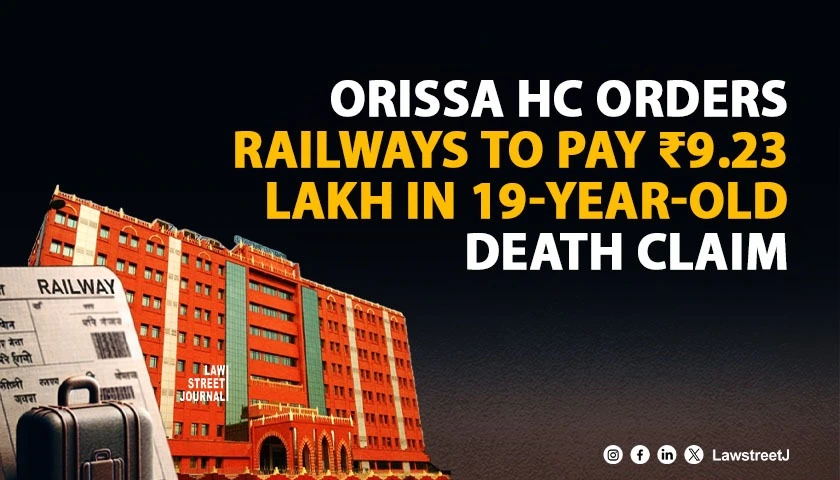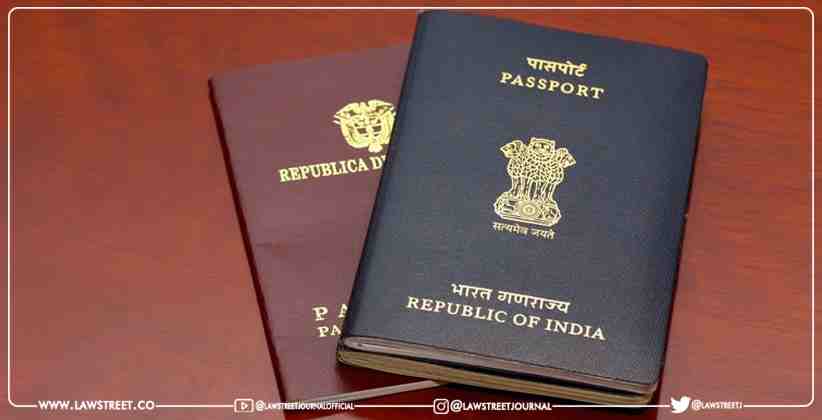Orrisa: The Orissa High Court has delivered a significant judgment directing the Railway Department to pay compensation to the family of a deceased passenger while strongly criticizing the administration for forcing bereaved families to endure prolonged litigation for nearly two decades.
Dr. Justice Sanjeeb Kumar Panigrahi allowed an appeal filed by Satyajit Swain against the Railway Claims Tribunal’s order dismissing his compensation claim for his father’s death during train travel in 2006.
The court noted that on December 25, 2006, the deceased Sarbeswar Swain was travelling from Allahabad to Cuttack by Neelachal Express when he accidentally fell inside the compartment due to a sudden jolt, sustained grievous brain injuries, and succumbed to them on December 27, 2006, at Gaya Government Hospital.
Rejecting the Railway Claims Tribunal’s distinction between accidents occurring “from” a train versus “inside” a train, the court relied on the Supreme Court’s judgment in Union of India v. Prabhakaran Vijaya Kumar, which held that “it will not legally make any difference whether the deceased was actually inside the train when she fell down or whether she was only trying to get into the train when she fell down. In our opinion in either case it amounts to an ‘accidental falling of a passenger from a train carrying passengers’.”
The court emphasized the principle of strict liability in railway accidents, stating, “Section 124-A lays down strict liability or no fault liability in case of railway accidents. Hence, if a case comes within the purview of Section 124-A it is wholly irrelevant as to who was at fault.”
Elaborating on the rationale behind strict liability, Justice Panigrahi observed, “The basis of the doctrine of strict liability is twofold: (i) The people who engage in particularly hazardous activities should bear the burden of the risk of damage that their activities generate, and (ii) it operates as a loss distribution mechanism, the person who does such hazardous activity (usually a corporation) being in the best position to spread the loss via insurance and higher prices for its products.”
The court strongly criticized the Railway Administration for the unconscionable delay in providing relief, stating, “It is of grave concern to this Court that the present claim arises from an incident that occurred as far back as 25.12.2006. Nearly nineteen years have passed, yet the bereaved legal heir has been compelled to run from pillar to post for relief. Justice delayed is justice denied, and in the context of a beneficial legislation such as the Railways Act, this denial assumes a character of cruelty.”
Justice Panigrahi further observed that, “The Railways enjoy monopoly over passenger transportation across vast stretches of this country. With this privilege comes an onerous responsibility to uphold the trust reposed in them by millions of citizens. When a passenger dies during train travel, the first obligation of the Railways is to extend compassion and assistance to the grieving family.”
The court emphasized that beneficial legislation must receive liberal interpretation, noting, “The Railways Act, being a social welfare legislation, must receive a broad and liberal interpretation. Its purpose is not merely to regulate railway administration but to safeguard the rights of passengers who place themselves entirely in the care of the Railways.”
Regarding compensation calculation, the court applied the Supreme Court’s decision in Union of India v. Radha Yadav, explaining, “The measure of compensation shall be determined by first calculating the amount payable under the Schedule as applicable on the date of the accident, together with a reasonable rate of interest thereon up to the date of the award. This amount is then to be compared with the sum prescribed under the amended Schedule operative on the date of award, and the claimant shall be entitled to whichever of the two is higher.”
The court calculated that with 7% per annum interest from the date of accident (when compensation was Rs. 4,00,000) till September 2025, the total amount worked out to Rs. 9,23,562, which exceeded the current statutory amount of Rs. 8,00,000.
In a scathing indictment of the Railway Administration’s conduct, the court observed, “The State and its instrumentalities must remember that they exist to serve the people, not to obstruct them. It is not sufficient that compensation be paid eventually; it must be paid in time, when it can actually relieve suffering. Justice delayed by nearly two decades cannot restore what was lost. It only compounds grief with bitterness.”
The court concluded with the powerful observation that, “Beneficial legislation must be given effect to in a manner that heals, not in a manner that harms. Justice demands nothing less.”
In conclusion, while emphasizing the principle of strict liability in railway accidents and criticizing administrative delays, the Orissa High Court directed the East Coast Railways to pay Rs. 9,23,562 as compensation within four months, with interest at 7% per annum in case of further delay.
APPEARANCES: Mr. Biswajit Mohanty, Advocate appeared for the Appellant, whereas Mr. Alok Kumar, CGC appeared for the Respondent.
CASE TITLE: Satyajit Swain v. Union of India [FAO No.206 of 2024]




![Orissa HC awards Rs 10 lakh to father who lost child to stray dog attack [Read Judgment]](/secure/uploads/2023/12/lj_3371_Stray_dog_menace.jpg)
![Orissa HC rules in favour of BJDs Lok Sabha MP Anubhav Mohanty in divorce plea [Read Judgment]](/secure/uploads/2024/01/lj_2524_Anubhav_Mohanty.jpg)
![Indian Courts this Week: Law Street Journal's Weekly Round-Up of SC & HCs [Jan 1 - Jan 6]](/secure/uploads/2024/01/lj_9050_WhatsApp_Image_2024-01-06_at_12.07.10_PM.jpeg)






